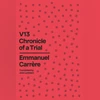The Bataclan terrorists' trial: 10 months of unparalleled horror and pity
The book of Abdeslam turns out to be not that profound - as the trial progresses, Carrere decides he is a "sap caught up in his own contradictions" and an "abysmal void wrapped in lies."
)
V13: Chronicle of a Trial
Listen to This Article
V13: Chronicle of a Trial
Author: Emmanuel Carrère & John Lambert
Publisher: Farrar, Straus & Giroux
Pages: 304
Price: $29
Also Read
To wonder aloud how something will affect him is a classic Carrèrian gambit: candid, tantalising, rhetorically risky, unapologetically self-involved. His insistent “I” is intimate, not imperial. In V13, the reader experiences the trial through his account, adapted from the 1,400-word columns he wrote each week for the French magazine L’Obs. A postscript by his editor conveys surprise that Carrère “could agree to spending months on end uncomfortably seated in a maximum-security courtroom listening to hearings that are as gruelling as they are endless.”
And the hearings are gruelling and endless — starting with the testimonies of the first responders before moving on to the plaintiffs, around 15 of them a day. What they describe is so “frighteningly intense” that it warps Carrère’s sense of time. There are stretches when he is riveted. There are stretches when he is bored. But he also recognises that the testimonies amount to something immense and extraordinary. “Everyone experienced these same moments with their own history, their own complications, their own deaths, and they’re now describing them in their own words,” he writes, marvelling at “the courage it took them to rebuild their lives, their way of living this experience and the strength of the ties that bind them to the dead and to the living.”
What happened on the evening of November 13, 2015, was horrific. That night, 130 people were murdered; at least one survivor killed himself two years later. Carrère recounts testimonies that are graphic and violent. One woman recalls how she felt a man pressed up behind her wheeze as he died, making her the only witness to his death, even though she “will never know his name.”
So many of the victims were young, and Carrère, who was 63 at the time of the trial, finds himself identifying with the parents. One father is so committed to “restorative justice” that he shocked everyone by co-writing a book with the father of one of the suicide bombers at the Bataclan. Carrère says that he admires such an extreme example of generosity and civility, but he is undeniably moved by the “archaic fury” of another victim’s father. The man’s eruptions of hatred and vengeance are irreducibly human. They are also, Carrère points out, the very reason the legal system exists — so that we can substitute “justice for revenge”.
The accused, for their part — those “second stringers” for the Islamic State — strike Carrère as bumbling and banal. Unlike most propaganda, the videos put out by the Islamic State don’t even try to present a “virtuous face”; instead, the group “lauds itself for its sadism.” One defendant, when asked about the videos, said, “You have to put them in context. It’s like young people today who watch series on Netflix.” He insisted that the terrorist rampage of November 2015 was a matter of righteous retaliation: “I can understand that people feel sorry for those killed and hurt in the attacks, but they were a response to violence. When you’re being killed in Syria, it’s normal to come and kill in France.”
Carrère seems to be both fascinated and repulsed by such declamations, which evoke the “defence of rupture”, a strategy deployed by the controversial lawyer Jacques Vergès in the 1987 trial of the Nazi officer Klaus Barbie. The idea was to question the justice system itself, to argue that even if the Nazis tortured in France, the French tortured in Algeria. It’s a form of extreme whataboutism, contextualising to the point of nihilism.
But as a writer, Carrère is also aware that at least some context is necessary for understanding what happened. More than once in V13 he recalls something said by Salah Abdeslam, a defendant who was supposed to blow himself up during the attacks but said he decided against it at the last minute: “Everything you say about us jihadists is like reading the last page of a book. What you should do is read the book from the start.”
The book of Abdeslam turns out to be not that profound — as the trial progresses, Carrère decides he is a “sap caught up in his own contradictions” and an “abysmal void wrapped in lies.” After the prosecution’s closing remarks, Carrère is utterly convinced by their arguments, though he also knows that the defence’s closing remarks will pry open a space for doubt. “I have no difficulty going along with other people’s reasoning, which is both a merit — the absence of prejudice — and a flaw — the risk of spinning like a weathercock and always agreeing with the last person to speak.”
V13 is a hopeful book, but not in any grand sense of good trouncing evil. What happened in that white plywood box in the lobby of the Palais de Justice was “a unique experience of horror, pity, proximity and presence.” Carrère says the trial yielded something sacred. Collectively, the plaintiffs were trying to make their way to a shared understanding. “They’re not facts that can be reeled off, but voices that unfold.”
The reviewer is the nonfiction book critic for The Times.
More From This Section
Topics : BOOK REVIEW books
Don't miss the most important news and views of the day. Get them on our Telegram channel
First Published: Nov 24 2024 | 11:52 PM IST

